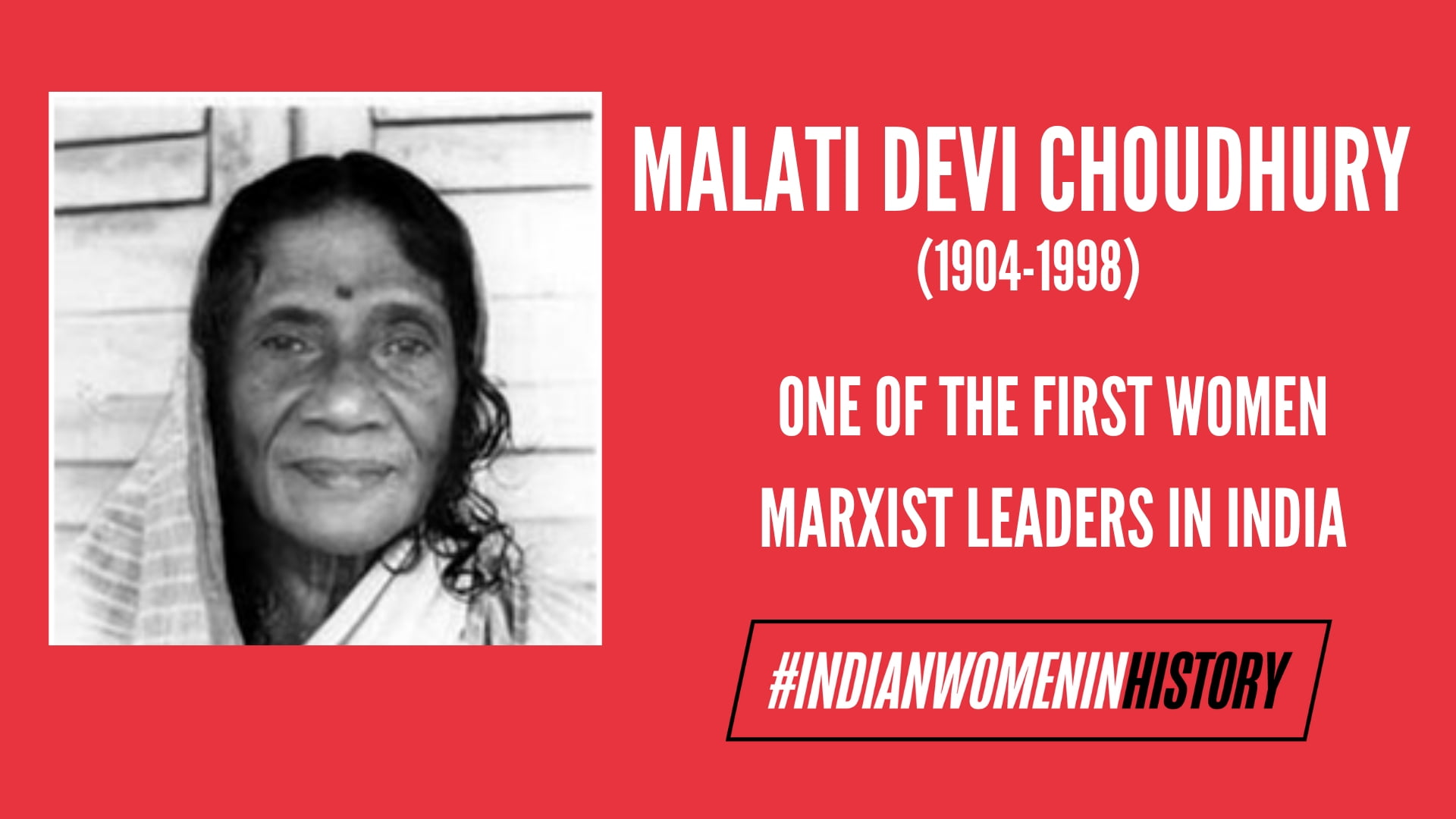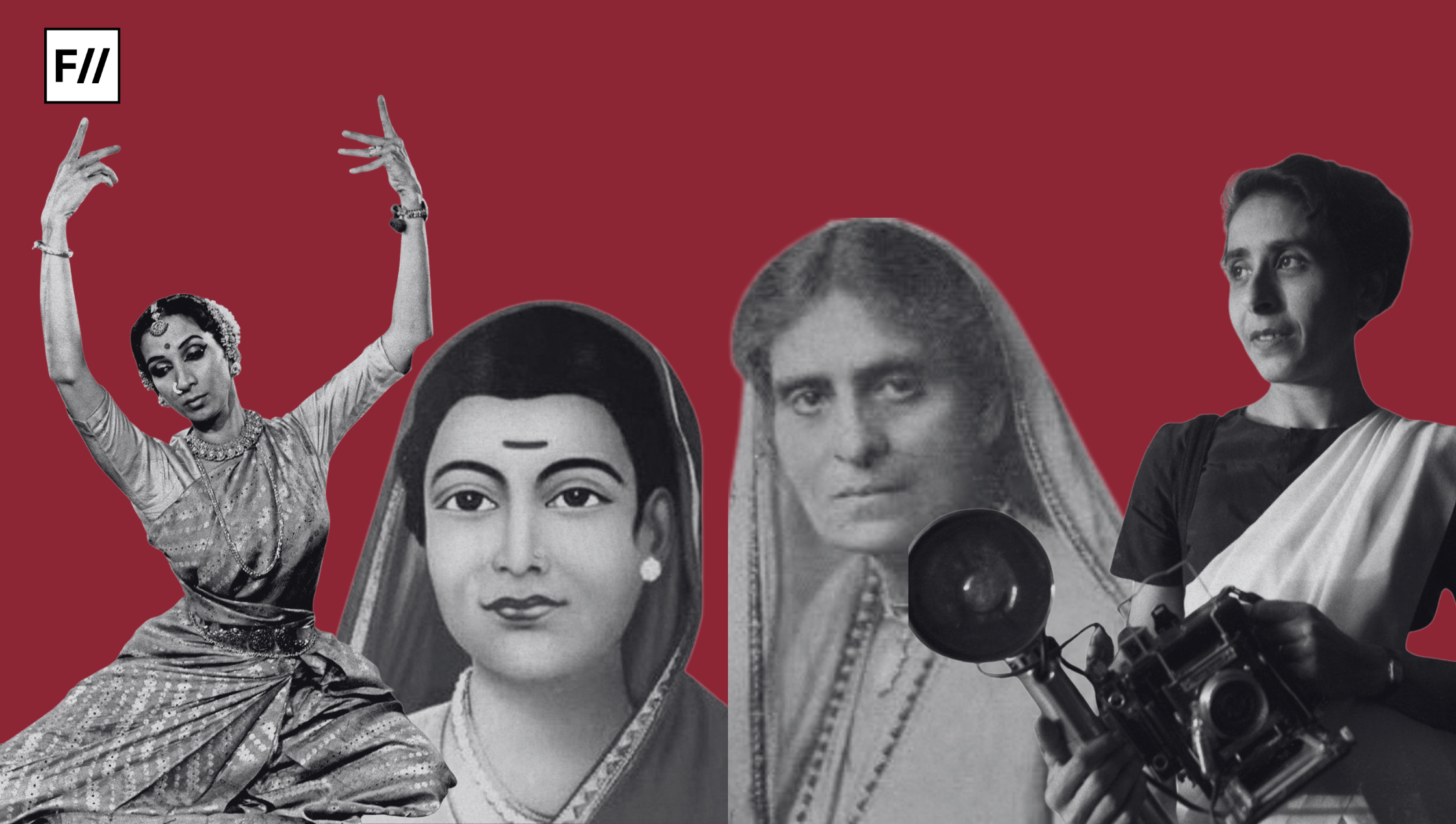Malati Devi Choudhury, born into a family of politicians, gave up the comfort of her life and her political position in order to join the fight against the system. She toiled in different parts of Orissa helping different sections of people. Her dedication towards the workers pushed Orissa towards socialism. A true Marxist in nature, she worked with and for the people. She raised her voice to help farmers against state repression, to fight untouchability and casteism, to educate children, and to elevate the conditions of women. Malati Devi proved to be a woman whose work had a significant impact on the local as well as the national level even after her years.

Early Life
Malati Devi Choudhury was born on 26th July 1904 in East Bengal. Her father, Kumud Nath Sen, who was a barrister, died when she was only two and a half years old. Malati was raised by her mother, Snehlata Sen, who was a writer and a translator.
Her family was rich with politicians. Her grandfather Beharilal Gupta was an ICS officer, her cousins Indrajit Gupta and Ranjit Gupta went on to become the Home Minister and the Chief Secretary of West Bengal respectively, and her brothers PK Sen and KP Sen were Income Tax Commissioner and Indian Postal Service Officer respectively. However, Malati did not choose the path of formal politics. Instead she decided to work for and with the people.

At the age of 16, Malati was admitted to Viswa Bharati in Santiniketan. Here she was influenced directly by the teachings and principles of Rabindranath Tagore who called her “Minu”. In Santiniketan, she not only obtained a degree but also actively participated in various dance, drama, and music sessions. In the process, she acquired an immense knowledge of various types of arts.
She played a central role in the peasants uprising in Orissa in the 1930s.
She met Nabakrushna Choudhury in Santiniketan and married him in 1927. They settled in a small village named Anakhia, now in the Jagatsinghpur District of Orissa. Malati worked extensively with the farmers in Orissa. She began a series of measures to aid in rural development. This included adult education and women and children empowerment programmes.
Activism
She played a central role in the peasants uprising in Orissa in the 1930s. She, with the help of others, established the Utkal Provisional Kisan Sabha. The inaugural session of the same, held in Cuttack, was a landmark because it was here that a resolution was passed for the abolition of the Zamindari system. Several Kisan Committees sprang up post the same.
She led the Krisaka Andolan to save poor farmers from the abuse of landowners and moneylenders. It is believed that her speeches and presence proved to be critical in mobilising people against the government during the Dhenkenal, Bhuban and Nilakanthpur shooting incidents. The shooting happened against demands put by local groups to abolish forced labour and to demand just forest laws and civil liberties.
Malati’s involvement in the peasant movement was not only limited to meetings. She also organised literary campaign along the farmers. She financed the publication of an Oriya weekly called Sarathi that talked about the conditions of farmers under the Britishers.

In 1933, Malati and her husband organised the Utkal Congress Socialist Workers League. It was by many accounts the first openly socialist organisation in India. Being a Marxist organisation, it believed in uniting the workers against different forms of oppression. The organisation rallied against casteism and untouchability. It later became the Orissa branch of the All India Congress Socialist Party.
In 1934, Malati Devi Choudhury became an important figure in Gandhi’s padyatra in Orissa. She took charge of organising the journey to different destinations. Because of her previous work in the region, she was able to garner people’s attention. She raised her voice against capitalism and organised charka spinning protests and civil disobedience marches in various regions. During her marches she was arrested several times (1921, 1930, 1936, 1942).

In 1946, Malati set up the Bajiraut Chhatravas which aimed to educate the children of freedom fighters. Named in the memory of a young boy, Baji Raut, who was shot dead by the British imperialist forces when he refused to row them across the river, Bajiraut Chhatravas has become an institution of national importance. Today it hosts orphans, and Dalit and tribal children of Orissa. In the same year, Malati also founded the Post Basic School at Champatimunda. She accompanied Acharya Binoba Bhave during his journies through Orissa for the Bhoodan Movement.
When Emergency was proclaimed in 1975 Malati protested against the dictatorial policies of Indira Gandhi and her government. This resulted in her imprisonment.
In 1948, Malati, along with some other freedom fighters, set up the Utkal Navjeevan Mandal at Angul in Orissa. The institute worked for rural development and tribal welfare in Orissa. In 1978 the Indian government established The State Resource Centre for Adult Education in Orissa with the help of Utkal Navjeevan Mandal.
As President of the Orissa Civil Liberties Committe, hers was among the first voices in the country to strongly condemn killings of Naxalites. She kept the demands of the landless poor peasants and the tribals at the forefront. All of this gave her the tag of ‘mother of Odissa’.
Politics
On 9th December 1946, she was selected as a member of the Constituent Assembly of India and she became the President of the Orissa Pradesh Congress Committee. She was one of the women who helped draft the Indian Constitution.
Also read: These Are The 15 Women Who Helped Draft The Indian Constitution
However, she quit the assembly soon after to work with Gandhi in Noakhali. She wanted to focus on her work with farmers, dalits, tribals, and children.

She wrote why she felt unfit for the duty in a letter 25 years after the assembly first met. She said that she felt like a “helpless school student” in front of the male jurists. Her discomfort was with the elitist and inorganic nature of the construction of the constitution. She believed that the constitution was not giving voice to the marginalised sections.
When Emergency was proclaimed in 1975 Malati protested against the dictatorial policies of Indira Gandhi and her government. This resulted in her imprisonment.
Malati Devi passed away in 1997 at the age of 93.
Recognition
During her lifetime, Malati Devi Choudhury received massive recognition and several praises in the form of awards. These included The National Award for Child Welfare in 1987, Jamnalal Bajaj Award in 1988, Utkal Seva Sammaan in 1994, and The Tagore Literacy Award in 1995.

This ceaseless woman fighter spurned offices of power to live and worked with the oppressed people. She fearlessly raised her voice against the colonial state, the feudal rulers, as well as the authoritarianism of the elected Indian government.
Also read: Sathyavani Muthu: The Dalit Politician Who Stood Up To Karunanidhi | #IndianWomenInHistory
References
1. The Tribal Tribune
2. Women Architects of the Indian Republic
3. StreeShakti
4. Odisha Woman
5. Nuaodisha
About the author(s)
Kavya is currently pursuing her MA in Media and Cultural Studies from TISS, Mumbai.




